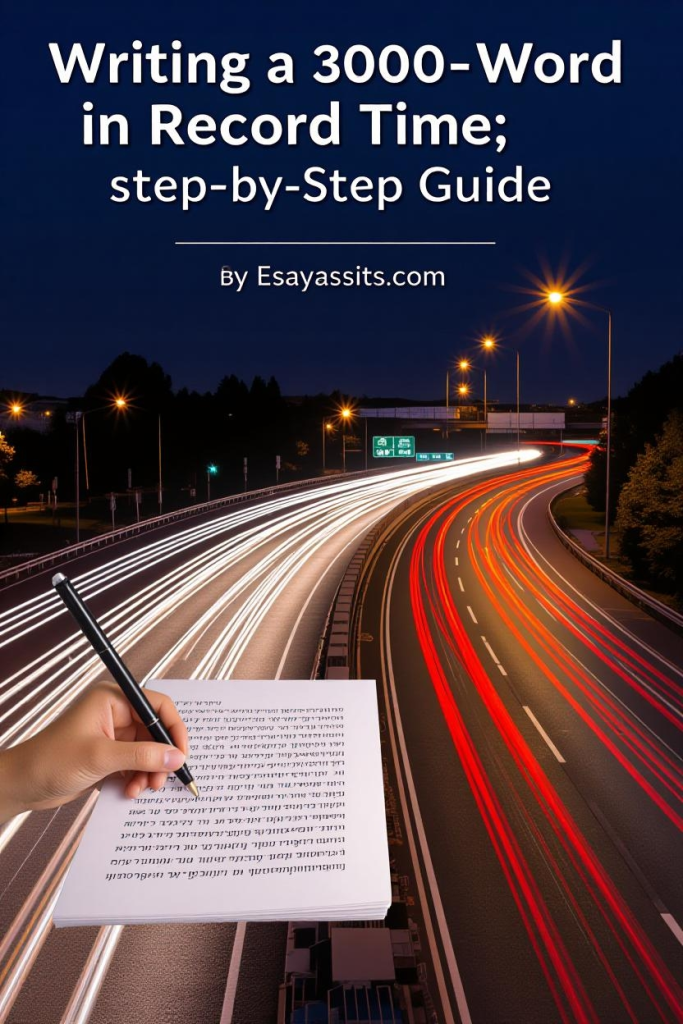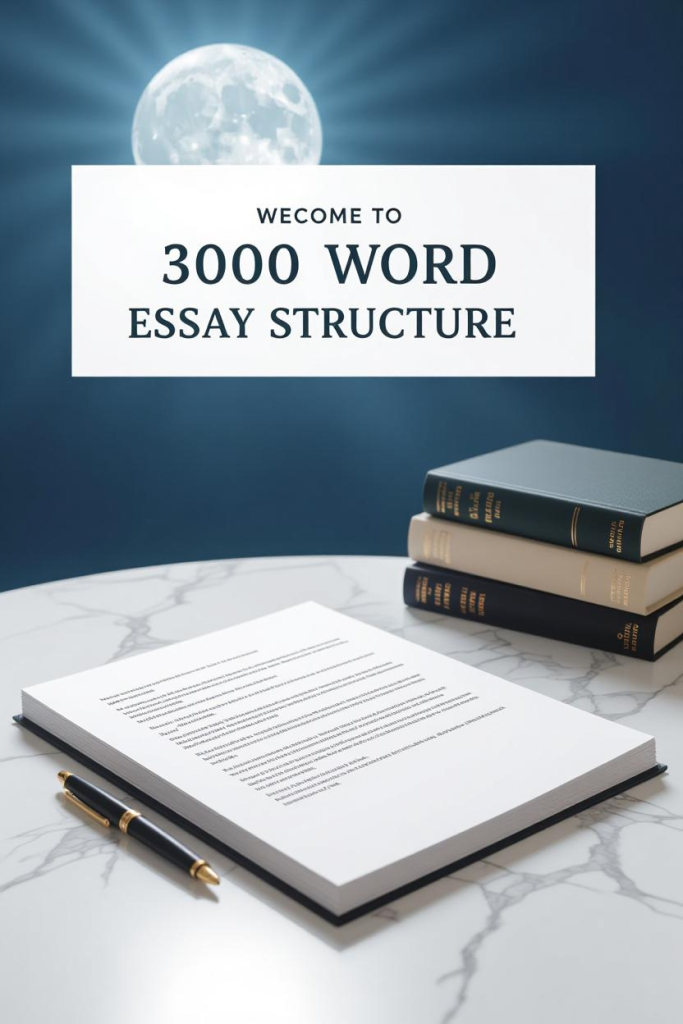
Learning how to write a 3000-word essay might require patience and a bit of discipline, especially when you are just starting out! If you are already familiar with basic essay writing rules, this helpful guide will provide critical aspects of the essay writing process.
Since many different topics can be used, some rules for academic essays must be followed. It is what makes writing essays challenging when you only wish to write essays faster. Some students even turn to artificial intelligence to speed things up, yet our Essayassits.com human experts are happy to provide a personalized and, frankly, better solution.
Read on to learn how to grab the reader’s attention, structure your essay, choose a good topic, and write an entire essay to earn the top grades!
How to Write a 3000-word Essay Quickly in 6 Steps
The main purpose is to cover all the essay’s main points as you work on your essay structure and meet the final word count. At the same time, academic essays of this type are not about how many words you can write but about a good thesis statement. Let’s start with the obligatory steps you must take from the main ideas to the concluding sentence.
Step 1: Explore your 3000-word essay prompt or choose a good topic.
Any decent writing process must start with exploring a given prompt or choosing a suitable topic you know well. Before writing, look for the main argument you can support with all the key points at play. You may look through academic databases and see if you can come up with adequate research first. Do not rush at this stage because you must have some supporting evidence for a subject you wish to work with. If this poses a problem, you may approach essay writers at Essayassits.com to find a better, more streamlined way to tackle the task.
Step 2: Research your chosen topic first.
Once you have a topic, think about a good structure and see what can go in the first paragraph, where you introduce things. Outline your essay’s purpose before you go any further with the main body of your essay. Do not use bullet points initially, but provide background information. For example, if you are writing on climate change, think about ideas and place them in a logical order. It will make your essay more readable.
Step 3: Create an essay outline.
This might be one of the most challenging parts in learning how to write a 3000-word essay. Still, it all comes down to:
- An introduction that is around 300 words.
- A thesis statement that goes at the end of your introduction.
- 5–6 body paragraphs with 400–500 words.
- A conclusion that is around 300 words as well.
Step 4: Work on your thesis statement and topic sentences.
The key to a successful writing process is a thesis statement that outlines the main points of your essay. For this purpose, take your time to provide context and explain your research subject. An argument must be within the field of your discussion. Thus, think about making a point in your paper after the introduction. It must answer the main question of your topic.
The same applies to a clear topic sentence for one paragraph with reliable sources. A golden rule is to break down your ideas into paragraphs to create a logical flow. Accordingly, use transition sentences before you dive into research work.
Step 5: Edit and proofread your writing.
Editing and revising your paper is as important as researching and citing everything properly. Make a rule to have final thoughts in the conclusion and check line spacing and citation style. The best essay editing service, like Essayassits.com, is also a good way to save precious time. Remember that every argument that you make must have supporting evidence.
Step 6: Check formatting and sources (if any).
Once you finish proofreading and editing, check your reference list again. It helps to ensure that every source is cited in the main body. Unfortunately, this part is often ignored in essay writing as students focus on the word count problems instead.
3000-word Essay Structure

Introduction
A good essay starts with a clear introduction paragraph. It helps explain your ideas and focus on your research’s main argument. Once done with the first 3000-word paper paragraph, think about coming up with a thesis statement. Since it can be different, let’s review the diverse types:
| Thesis statement type | The purpose | Essay thesis example |
| Explanatory | Focuses on explanation without taking sides. | The introduction of artificial intelligence in education has placed new challenges for educators as they have to identify whether a student has truly written an assignment. |
| Analytical | Breaks down a certain idea into parts and analyzes. | C.S. Lewis’s use of symbolism in the Narnia Chronicles clearly references Biblical stories and a fight between good and evil. |
| Argumentative | Makes a claim and presents an argument by taking sides. | AI-based tools in education can help autistic children learn without various human triggers. It will provide better control of the learning environment and increase mental stability. |
Body
The body paragraphs must include:
- A good topic sentence for your 3000-word paper.
- Clear evidence for your ideas.
- Analysis and interpretation of the included data.
- A concluding line that supports your thesis.
Conclusion
The conclusion paragraph must repeat things said in your introduction, but through the prism of your thesis statement. For example, a conclusion may or may not have a call-to-action sentence. As a result, create a sense of completion with a good explanation. Continue with the works cited page.
9 Tips for Efficient 3000-Word Essay Writing
- Set a timer to discipline yourself.
- Remove distractions like social media, TV, or noisy friends.
- Choose a topic that inspires you or something you know well.
- Start writing with an interesting fact or statistic.
- Make it a rule to write continuously without stopping too often.
- Don’t censor yourself in the first draft—just edit later.
- Use one idea per paragraph for clarity.
- Provide practical examples your audience can relate to.
- Proofread aloud to catch mistakes and awkward phrasing.
50 Inspiring 3000 Word Essay Topics to Consider

(List remains the same as in your draft, covering topics like renewable energy, social media, AI in education, cultural heritage, women’s rights, etc.)
Common Writing Mistakes to Avoid
- Going over the word limit.
- Forgetting to cite sources properly.
- Writing vague or repetitive ideas.
- Mixing citation styles.
- Making the introduction too long.
- Ignoring the prompt’s instructions.
- Using clichés instead of strong examples.
- Introducing new information in the conclusion.
- Skipping proofreading and editing.
Whenever You Need a Helping Hand in Writing a 3000 Word Essay!
Not everyone is born a natural writer to compose an excellent 3000-word essay fast. Things can get even more complex when you have less than 24 hours. When you do not know what to write or how to work on your thesis, Essayassits.com is here to help. Our experts know how to structure essays, strengthen arguments, and polish papers for top grades. We’re available 24/7 and ready to make your writing journey easier!
Frequently Asked Questions (FAQs)

1. How long does it take to write a 3000-word essay?
It depends on preparation. With good research and an outline, it may take 6–10 hours. Without preparation, it could stretch over several days. If you’re short on time, breaking it into chunks (intro, body, conclusion) helps you finish faster.
2. How many paragraphs should a 3000-word essay have?
A standard 3000-word essay usually has 15–20 paragraphs:
- Introduction: 2–3 paragraphs (about 300 words)
- Body: 6–8 sections with multiple paragraphs (about 2400 words total)
- Conclusion: 2–3 paragraphs (about 300 words)
3. What is the best structure for a 3000-word essay?
Follow this tried-and-true outline:
- Introduction (300 words): Hook + context + thesis statement
- Body (5–6 sections, 400–500 words each): Topic sentence + evidence + analysis
- Conclusion (300 words): Summarize key points + restate thesis + final insight
4. How do I pick a good topic for a 3000-word essay?
Choose a topic you’re familiar with or passionate about. It should be narrow enough to cover in detail but broad enough to find enough research. For example, instead of “Climate Change,” narrow it to “How Renewable Energy Can Reduce Climate Change in the U.S.”
5. What’s the fastest way to write a 3000-word essay?
- Start with a clear outline.
- Use the Pomodoro technique (25–30 minutes writing, 5-minute breaks).
- Write first, edit later.
- Eliminate distractions (social media, phone, TV).
- Use research notes to avoid wasting time searching mid-writing.
6. Can I finish a 3000-word essay in one night?
Yes, it’s possible if you stay focused, but the quality may drop. To do it successfully: choose a manageable topic, create a quick outline, write continuously, and edit only at the end.
7. What are the most common mistakes students make in long essays?
- Writing without an outline.
- Adding filler just to hit the word count.
- Forgetting to cite sources properly.
- Repeating the same idea in different words.
- Leaving editing and proofreading to the last minute.
8. Should I use headings in a 3000-word essay?
Unless your professor requires formal sections (like in research papers), you don’t have to. However, using headings and subheadings in your draft can help keep your writing organized.
9. How can I make my essay longer without adding fluff?
Expand with:
- More evidence and examples.
- Deeper analysis (explain why your point matters).
- Counterarguments and rebuttals.
- Clear transitions between ideas.
10. Where can I get help if I’m stuck?
If you’re running out of time or need expert guidance, Essayassits.com can connect you with professional writers who specialize in academic essays. They’ll help you brainstorm, outline, or even polish your final draft.
